News & Stories
2025
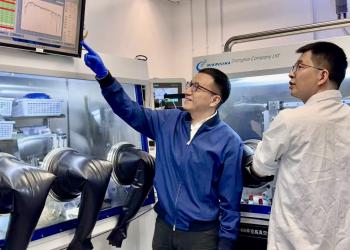
News
Inspired by Laminate: HKUST and PolyU Researchers Synthesize a Laminate-Structured Material Interface to Improve Perovskite Solar Cells
A collaborative research team from the Hong Kong University of Science and Technology (HKUST) and the Hong Kong Polytechnic University (PolyU) has developed an innovative laminated interface microstructure that enhances the stability and photoelectric conversion efficiency of inverted perovskite solar cells.
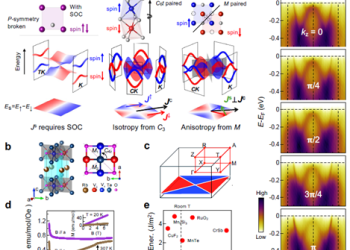
News
New Era of Magnetization: HKUST Research Sheds Light on Future Applications in Spintronics and Valleytronics
Altermagnets, which exhibit momentum-dependent spin splitting without spin–orbit coupling (SOC) or net magnetization, have recently attracted significant international attention. A team led by Prof. LIU Junwei from the Department of Physics at the Hong Kong University of Science and Technology (HKUST), along with their experimental collaborators, published their latest research findings in Nature Physics*, which unveiled the first experimental observation of a two-dimensional layered room-temperature altermagnet, validating the theoretical predictions in Nature Communications made by Prof. Liu in 2021.
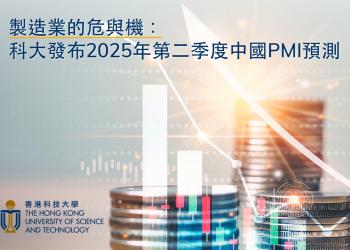
News
Manufacturing at a Crossroads: HKUST Releases 2025 Q2 PMI Forecasts for Mainland China
As the trade war escalates, the global economy is under increasing strain, generating significant uncertainty for the manufacturing sector. In the latest quarterly review on China’s manufacturing released by the Li & Fung Supply Chain Institute at the Hong Kong University of Science and Technology (HKUST), researchers revealed that, despite a forecasted slowdown in China’s manufacturing production in Q2 due to the trade conflict, Chinese manufacturers are well-prepared to meet this challenge, emphasizing that China’s role in global supply chains is essential and cannot be easily replaced.
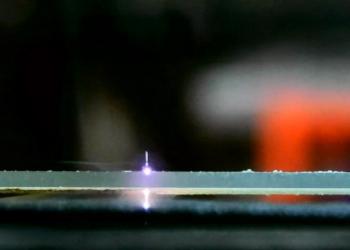
News
From Beam to Battery: HKUST’s Single-Step Laser Printing Supercharges High-Performance Lithium-Sulfur Batteries
A research team led by Prof. Mitch LI Guijun, Assistant Professor from the Division of Integrative Systems and Design at the Hong Kong University of Science and Technology (HKUST), has developed an innovative single-step laser printing technique to accelerate the manufacturing of lithium-sulfur batteries. Integrating the commonly time-consuming active materials synthesis and cathode preparation in a nanosecond-scale laser-induced conversion process, this technique is set to revolutionize the future industrial production of printable electrochemical energy storage devices. The findings of this study were recently published in the top journal Nature Communications.
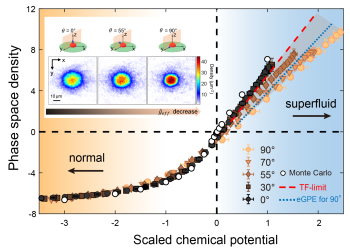
News
Unlocking the Secrets of Superfluid: HKUST Scientists Unveil How Dipolar Interactions Shape Two-Dimensional Superfluid Behavior
In a recent study, an international team of physicists, led by Prof. JO Gyu-Boong from the Department of Physics at the Hong Kong University of Science and Technology (HKUST) has made a significant observation of the BKT phase transition in a 2D dipolar gas of ultracold atoms. This groundbreaking work marks a major milestone in understanding how 2D superfluids behave with long-range and anisotropic dipolar interactions.
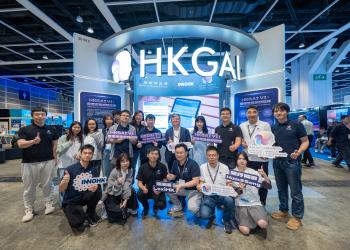
News
HKGAI Showcases New AI Research Achievements at InnoEX 2025
The Hong Kong Generative AI R&D Center (HKGAI), a joint-university collaborative venture, led by the Hong Kong University of Science and Technology (HKUST) with multiple universities, demonstrated how AI can be effectively integrated into the daily lives of citizens under the theme "AI Buddy for Hong Kong Citizens" at the InnoEX 2025.
With funding from the HKSAR government’s InnoHK initiative, HKGAI has further expanded its inventions for more practical applications since last year’s exhibition. Following the launch of HKGAI V1, the latest locally developed large model launched early this year, a series of new self-developed AI research projects based on the HKGAI V1 large model were debut at InnoEX 2025, including:
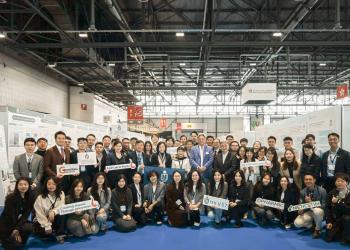
News
HKUST Achieves Record-Breaking Results at 50th International Exhibition of Inventions Geneva
The Hong Kong University of Science and Technology (HKUST) achieved a record-breaking success at the 50th International Exhibition of Inventions Geneva concluding today. Thirty-seven HKUST teams won a total of 38 awards, including two special grand prizes, 22 Gold Medals (of which seven received Congratulations of the Jury), and multiple Silver and Bronze Medals, showcasing the University’s outstanding performance across different fields including life and health technologies, artificial intelligence (AI) and data science, advanced manufacturing, new energy technologies and aerospace engineering. HKUST outshone other local universities and smashed its own record with this extraordinary haul of awards, reaffirming its status as a powerhouse of creativity and invention.
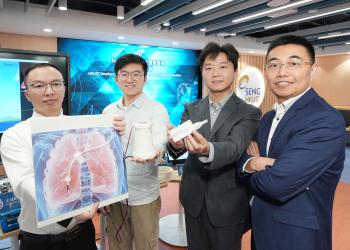
News
HKUST Develops Multiple Smart Devices to Advance Medical Innovation
A research team at the Hong Kong University of Science and Technology (HKUST) has developed three innovative smart medical devices for health monitoring, surgical assistance and rehabilitation. Integrating artificial intelligence (AI) with robotics technology, the devices seek to help doctors address challenges in treatment and diagnostics, improve medical procedures and enhance efficiency. Led by Associate Prof. SHEN Yajing from the Department of Electronic and Computer Engineering, the team is actively collaborating with public and private institutions, industry stakeholders and investors to promote the translation and clinical application of the three breakthroughs below.
AI Hand-Centric Tactile Interaction System (PhyTac):






